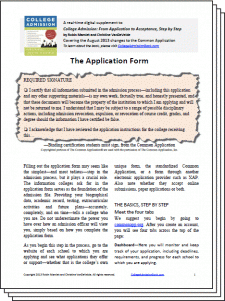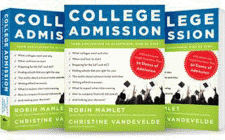A Month-by-Month Checklist for Seniors
Posted on Thu, 09/18/2014 - 11:13We're talking essays, financial aid and more with the Today Show's Jean Chatzky in The College Countdown: A month-by-month to-do list for high school seniors.

We're talking essays, financial aid and more with the Today Show's Jean Chatzky in The College Countdown: A month-by-month to-do list for high school seniors.

The Common Application goes live next week -- on Friday, August 1! So we're bringing you a real-time digital supplement to College Admission: From Application to Acceptance, Step by Step -- our completely revised and updated guide to The Application Form .
It's a complete guide to filling out the college application, which serves as the cornerstone of a student's admission file, including:

College Admission is featured in "A Summer Reading List from College Admission Counselors" in Valerie Strauss' Washington Post Answer Sheet blog. Thank you to Kenyon College Dean Jennifer Delahunty for recommending our book! This is a great list overall, assembled by Brennan Barnard, director of college counseling of The Derryfield School in Manchester, New Hampshire with suggestions for parents and students, as well as some all-around fun summer reading such as Claude Steele's “Whistling Vivaldi," recommended by: Susan Weingartner, Director of College Counseling at Chicago's Francis W.

Seniors, you're almost done. There are just a few things you need to be aware of over the summer in order to insure the transition to campus goes smoothly. Here's one last checklist for you:
Mark Moody, Co-Director of College Counseling at Colorado Academy, joins us again today with some fantastic guidance on the college essay. There is so much good stuff here, we don't even know where to begin to describe how helpful this will be to rising seniors as they begin their essays -- hopefully this summer. Moody's vivid explanations of "Show, Don't Tell," the concept of framing and the essay's first words are worth their weight in Common App gold. All we can say is, "Enjoy..."
Many thousands of young people take on the writing challenge of the college essay each year, making 500 to 650-word personal narrative one of the most popular forms of writing in America. Yet most of the authors of the form have never done it before, and most won’t do it again.

Fall of senior year is a busy time. So we strongly urge you to have at least your Common Application essay in good shape before senior year begins because writing the essays while attending school is like adding a class to your schedule -- remember, in addition to the Common App's, there are those in the supplements. Summer provides the luxury of uninterrupted time to reflect and write. And you're fortunate that the Common App essay prompts will remain the same, so you don't have to wait until August 1st to start working on them.
So here's some advice to kick start your essays over the coming summer months -- from a suggested reading list that we hope will inspire to some excellent step-by-step guidance on those Common App essay prompts.
Finding Your Voice in the Essay: A suggested reading list of first-person essays.
The Real Topic of your Essay is You: One strategy to help you find a topic.

As we head off into the summer, we asked our experts what rising seniors should be doing this summer. As usual, they've got some great advice about how to rest, recharge, and prepare for a couple of steps in the college application process so you'll hit the ground running -- and avoid feeling overwhelmed -- in the fall. And don't forget, two of the most important and best things you can do this summer are rest and read, read, read... Nothing will prepare you better for senior year. Enjoy all of it!
Mai Lien Nguyen
College and Career Center Coordinator
Mountain View High School
Mountain View, CA
“Having fun” and “preparing for college applications” aren’t phrases you normally hear in the same breath. But the summer before senior year could be the golden opportunity to make this happen. Let’s see how:

When College Admission was in high school, summers felt long and slow, a time to earn some extra money and hang out with friends. We worked as a neighborhood babysitter and a proof reader at the local newspaper. Earned a little extra high school credit with classes at the local community college -- one was a "typing course"! Polished short stories in the style of John Cheever that garnered a desk drawer full of rejection slips. On days off, we sprayed our hair with Sun-In and hit the deck at the pool. Every night, we met up with friends by the swings at Kilgore Park. There was so much time for everything.
Today, high school students -- particularly rising seniors -- may feel the need to fill their summer fuller. Terri Devine of Francis Parker School in San Diego, CA, joins us today to talk about summer plans -- particularly for any juniors stressing about their resumes. Read on for some good advice and great ideas…
What Should Juniors Be Doing This Summer?
The answer to this question is really quite simple…get some rest, read, and explore what you find truly interesting (and it would be fine with everyone if what you find truly interesting is a summer job…more on that later).

Now that you have your letters in hand and your decision made, take the time to inform all the people in your life who had a hand in your admission process about that decision. That includes the teachers who wrote recommendations, the high school college counselor who loaned you her College Board Handbook, the guidance counselor who advised you to take AP calculus, the English teacher who proofread your essays, the coach who wrote a letter to the athletic department, and the faculty advisor for the newspaper who encouraged you to write an editorial about the stress of applying to college. Let them know where you have decided to enroll and thank them for all they did to help you get there.
You can stop by their classroom or office to let them know in person, but a personal, hand-written thank you note is the most powerful and meaningful way to show your appreciation, according to Mark Moody, Co-Director of College Counseling at Colorado Academy -- and we agree! "Like many counselors, I have a folder full of them in my desk," he told us, "on rougher days, it's where we go to remember why we do this rewarding work in the college application trenches with you!"
Oh, and don’t forget a big thank-you for the people who have helped you get to this point for the last eighteen years . . . your parents.
Mark Moody, Co-Director of College Counseling at Colorado Academy, is back with us today with an excellent discussion of "outcomes" -- a meme in the media and a subject on the minds of some students, parents, educators and other interested parties. Read on to see why becoming "dis-oriented" from outcomes may provide the happiest ending.
I’ve noticed the term “outcomes-oriented” being used a lot lately. It’s apparently a desirable quality, describing my LinkedIn contacts on their profiles, applicants I encounter on hiring committees, professional services in marketing emails that land in my inbox. When you consider it, “outcomes-oriented” is an interesting pairing of words. It suggests a constant headlong bearing toward a projected future, radar locked on a defined finish line and a specific expectation of what should await there. It feels antsy and impatient. Let’s get to the outcome, people! Who cares how? Full speed ahead!